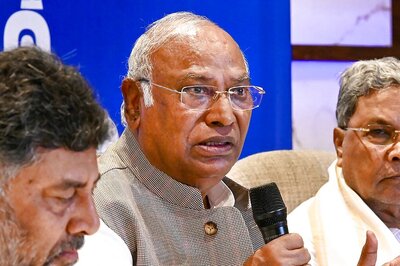
views
X
Research source
Making the Conversion

Write the number of kilograms. Converting from kilograms to pounds is simple. Best of all, once you know how to do it, it's something that you can use in a wide variety of situations. Start with the number of kilograms you want to convert. For example, let's say that you want to convert 5.9 kilograms to pounds. In the next few steps, we'll do just this.

Multiply by 2.2. Next, just multiply your kilogram measurement by 2.2. The answer you get is the number of pounds that is equal to your kilogram measurement. In the example from above, you can convert by multiplying 5.9 by 2.2. 5.9 × 2.2 = 12.98 pounds. Don't forget the "pounds" label. If you're doing this calculation for schoolwork, you can lose points if you leave the label off. If you're doing the calculation for something else, the person who reads your work may misunderstand your answer.

For greater accuracy, multiply by 2.2046. Technically, multiplying kilograms by 2.2 to get pounds is sort of a "shortcut" for easier conversions. If you want to get the most accurate result possible, you'll probably want to use a more accurate value for the conversion. 2.2046 should be accurate enough for most purposes. In the example above, if we use the more-accurate value, we get 5.9 × 2.2046 = 13.00714 pounds. This is a minor difference, but if we're aiming for very precise measurements, this may be the better choice. If you want to be even more accurate, consider using a conversion factor with more decimal places. At an extreme level of accuracy, one kilogram is equal to 2.2046226218 pounds.

To get back to kilograms, divide by 2.2. Getting from a pounds measurement back to kilograms is as simple as dividing the number of pounds by your conversion factor. In other words, if you used the basic "2.2" conversion above, divide by 2.2. If you used 2.2046, divide by 2.2046, and so on. In the example from above, you can get from 12.98 pounds back to the original kilogram measurement like this: 12.98/2.2 = 5.9 kilograms. Don't forget the label! Don't mix and match your conversion factors — only divide by the number you originally multiplied by. For instance, since you got 13.00714 pounds when you used the more accurate 2.2046 conversion, you wouldn't divide by 2.2. This would give you 13.00714/2.2 = 5.912 kilograms, which is slightly different from your starting 5.9 kilograms.
Converting to a Pounds and Ounces Measurement

Convert kilograms to pounds to get a decimal answer. There are many ways to represent pounds when you're not dealing with a whole number. Two common examples are decimals (i.e., 6.5 pounds) and fractions (i.e., 6 1/2 pounds). Another way to do this is with ounces. There are 16 ounces in a pound, so a pound-and-ounces measurement of, for instance, 6 pounds 8 ounces is like saying 6 8/16 pounds (or 6 1/2 pounds). To convert kilograms into this sort of pound and ounces measurement, start by doing the standard decimal conversion above. For instance, if you want to convert 7 kilograms to pounds and ounces, start by multiplying 7 × 2.2 = 15.4 pounds

Divide the decimal digits by 0.0625. As mentioned above, one ounce is 1/16 of a pound. This is equal to 0.0625 pounds. If you divide the numbers in your answer to the right of the decimal place by 0.0625, the answer you get will be the number of ounces. For example, if you want to figure out how to write your 15.4 pound answer above to pounds and ounces, you would get your number of ounces by dividing 0.4/0.0625 = 6.4. This means that the "0.4" in "15.4 pounds" is equal to 6.4 ounces.

Write your answer in the form "x pounds, y ounces." Once you know the number of pounds and ounces you're dealing with, getting your final answer is as easy as combining them. Write your answer by listing your number of pounds first, then ounces. For example: 10 pounds, 3 ounces. In the example problem, we have 15 pounds (from our original 15.4 pound measurement). We now know that the 0.4 decimal is equal to 6.4 ounces. This means our final measurement is 15 pounds, 6.4 ounces.

Work backwards to get back to kilograms. Getting from pounds and ounces back to kilograms requires two things. First, you need to convert your ounces back to pounds by multiplying them by 0.0625. Then, you need to convert your pounds back to kilograms by dividing by 2.2 (or whatever other value you used). In the example problem, you would convert back to kilograms like this: Start with 15 pounds, 6.4 ounces. Multiply 6.4 × 0.0625 = 0.4 pounds Add this to 15 to get 15.4 pounds. Divide 15.4/2.2 to get 7 kilograms.



















Comments
0 comment